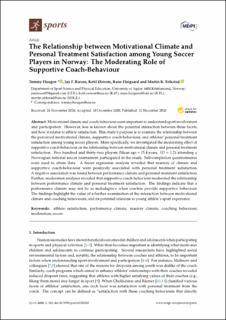| dc.contributor.author | Haugen, Tommy | |
| dc.contributor.author | Riesen, Jan F | |
| dc.contributor.author | Østrem, Ketil | |
| dc.contributor.author | Høigaard, Rune | |
| dc.contributor.author | Erikstad, Martin Kjeøen | |
| dc.date.accessioned | 2020-12-17T11:04:56Z | |
| dc.date.available | 2020-12-17T11:04:56Z | |
| dc.date.created | 2020-12-12T18:51:25Z | |
| dc.date.issued | 2020 | |
| dc.identifier.citation | Haugen, T., Riesen, J. F., Østrem, K., Høigaard, R. & Erikstad, M. K. (2020). The Relationship Between Motivational Climate and Personal Treatment Satisfaction Among Young Soccer Players in Norway: The Moderating Role of Supportive Coach-Behaviour. Sports, 8 (12). doi: | en_US |
| dc.identifier.issn | 2075-4663 | |
| dc.identifier.uri | https://hdl.handle.net/11250/2720000 | |
| dc.description.abstract | Motivational climate and coach-behaviour seem important to understand sport involvement and participation. However, less is known about the potential interaction between these facets, and how it relates to athlete satisfaction. This study’s purpose is to examine the relationship between the perceived motivational climate, supportive coach-behaviour, and athletes’ personal treatment satisfaction among young soccer players. More specifically, we investigated the moderating effect of supportive coach-behaviour on the relationship between motivational climate and personal treatment satisfaction. Five hundred and thirty-two players (Mean age = 15.4 years, SD = 1.2) attending a Norwegian national soccer tournament participated in the study. Self-completion questionnaires were used to attain data. A linear regression analysis revealed that mastery of climate and supportive coach-behaviour were positively associated with personal treatment satisfaction. A negative association was found between performance climate and personal treatment satisfaction. Further, moderation analyses revealed that supportive coach-behaviour moderated the relationship between performance climate and personal treatment satisfaction. The findings indicate that a performance climate may not be as maladaptive when coaches provide supportive behaviour. The findings highlight the value of a further examination of the interaction between motivational climate and coaching behaviours, and its potential relations to young athlete’s sport experience. | en_US |
| dc.language.iso | eng | en_US |
| dc.publisher | MDPI | en_US |
| dc.rights | Navngivelse 4.0 Internasjonal | * |
| dc.rights.uri | http://creativecommons.org/licenses/by/4.0/deed.no | * |
| dc.title | The Relationship Between Motivational Climate and Personal Treatment Satisfaction Among Young Soccer Players in Norway: The Moderating Role of Supportive Coach-Behaviour | en_US |
| dc.type | Journal article | en_US |
| dc.type | Peer reviewed | en_US |
| dc.description.version | publishedVersion | en_US |
| dc.rights.holder | © 2020 The Author(s) | en_US |
| dc.subject.nsi | VDP::Medical disciplines: 700::Sports medicine: 850 | en_US |
| dc.source.pagenumber | 10 | en_US |
| dc.source.volume | 8 | en_US |
| dc.source.journal | Sports | en_US |
| dc.source.issue | 12 | en_US |
| dc.identifier.doi | 10.3390/sports8120162 | |
| dc.identifier.cristin | 1859104 | |
| cristin.qualitycode | 1 | |

